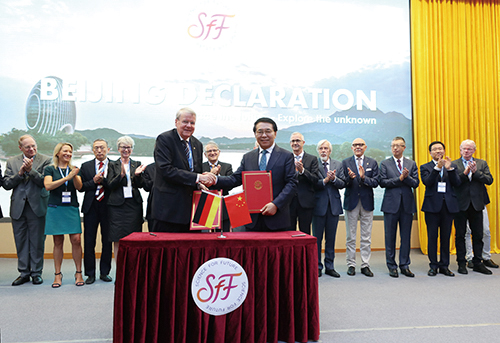
Under the?theme “Science for Future: All Starts with Basic Research”, the Chinese Academy of Sciences (CAS) and the German National Academy of Sciences Leopoldina (Leopoldina) held their first joint conference early September in Beijing to address common future challenges. On September 9, CAS President BAI Chunli and Leopoldina President J?rg Hacker officially signed and announced The Beijing Declaration on Basic Science* (Declaration) on behalf of the two sides.
Humankind is facing with a series of serious challenges with global implications, says the Declaration. Problems including climate change, resource shortages and unbalanced development are putting increasing economic, environmental and social pressures on our societies. The key to solving these problems lies in strengthening basic research and promoting scientific progress. Science has to move forward to provide the basis for the sustainable development of human civilization and to assume greater responsibility for the provision of knowledge.
Looking at the future, the two academies are to actively advocate science advancement and strengthen their cooperation in promoting science development and enhancing basic research. The two jointly propose deepening the understanding of science and basic research and their role in society, promoting collaborative and responsible scientific research, and creating an inspiring environment for science advancement.
To meet these goals, the two academies pledge to actively play the role of bridges between science and society. With their activities, they will promote the value and significance of science and basic research in the public. Under the theme “Science for Future”, they will organize a series of activities to exchange views on scientific issues of social relevance and common concern, to further academic exchange and to promote the growth of young scientists. They will further strengthen the mutual trust, consensus and cooperation between the two academies and establish a knowledge-based, robust fundament for further scientific development in the international community.
CAS is the linchpin of China’s drive to explore and harness high technology and the natural sciences for the benefit of China and the world. Comprising a comprehensive research and development network, CAS brings together scientists and engineers from China and around the world to address both theoretical and applied issues using world-class scientific and management approaches.
The Leopoldina originated in 1652 as a classical scholarly society and now has thrived in almost all branches of science. It?represents the German scientific community internationally, and provides policymakers and the public with science-based advice.

